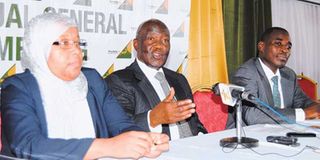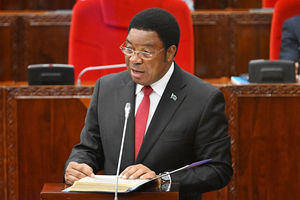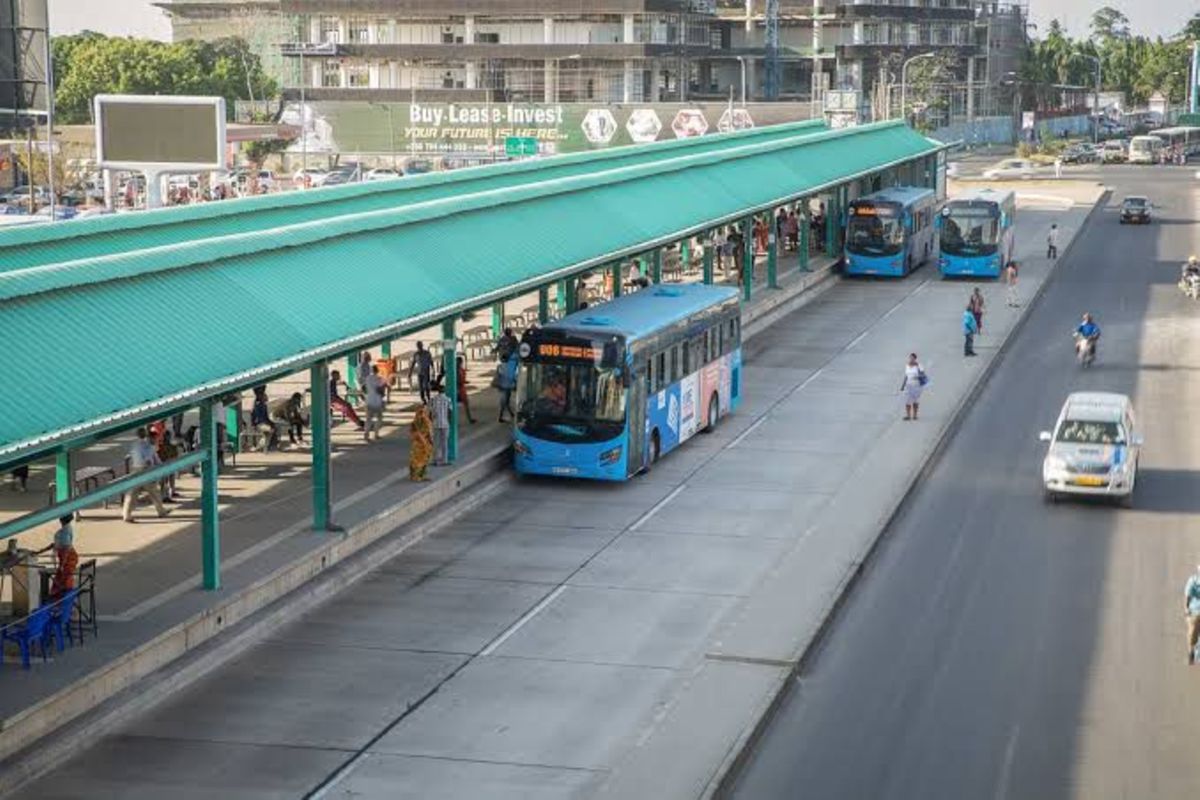Precision Air doing well: Shirima

Precision Air board of directors Michael Shirima speaks at a press conference in Dar es Salaam in Febuary this Year.Left is Precision Air group Managing Director and Chief executive Officer Sauda Rajab and Finance director Elly Osewe . Photo|File
What you need to know:
In an exclusive interview with this paper in his Arusha office recently, the Tanzanian entrepreneur, who solely founded the airline in 1991 as a charter-flight company and later turning it into a full passenger carrier in 1993, dismissed the ever growing paranoid among Tanzanians when it comes to dealing with Kenyans.
Arusha. Financial woes that subjected Tanzania’s leading private passenger airline Precision Air (PW) into a staggering Sh30 billion loss in 2012 are nothing, but an eye opener for the company, the company’s chairman and majority shareholder, Michael Shirima has said.
In an exclusive interview with this paper in his Arusha office recently, the Tanzanian entrepreneur, who solely founded the airline in 1991 as a charter-flight company and later turning it into a full passenger carrier in 1993, dismissed the ever growing paranoid among Tanzanians when it comes to dealing with Kenyans.
The airline partnered with Kenya Airways in 2003 in a deal, which left Shirima as the majority shareholder with 51 per cent stake after selling 49 per cent shares to Kenya’s national carrier, making it the second largest airline in the East African region.
By 2007, it had successfully expanded its aircraft fleet to 12, while operating in 12 Tanzanian regions, as well as flying to a number of regional destinations, including Mombasa, Nairobi, Entebbe, Lubumbashi, Lusaka, Johannesburg and Moroni in the Comoros.
This was after it was successfully voted the most respected company, the airline of the year in Tanzania and the third airline in Africa to embrace e-ticket technology, all coming in a span of one year - 2006.
In the same year, the airline scooped the International Air Transport Association’s Operational Safety Certification, making it the first in Tanzania and the sixth in Africa to receive the prestigious award.
Emphasising that the airline with Kenya Airways was a blessing rather than a regret, Shirima says: “Our problems at PW had nothing to do with the fact that we were in partnership with Kenya Airways as some people are made to believe, but it was rather a shortfall that can happen in any business entity regardless of its affiliation,” he said. He allayed fears among Tanzanians of being overshadowed by working with Kenyans under the umbrella of the East African Community urging them to take the country’s economic advancement as a challenge rather than a setback to Tanzania’s development.
He said the East African Community was the best option for the five countries of Burundi, Kenya, Tanzania, Rwanda and Uganda to venture upon in order to come together strongly as an economic block and a single market against the ever competing global economic forces.
“Kenya is the region’s economic hub. We cannot afford to isolate it as long as we want to forge ahead economically as we need each other to advance economically. Closing our doors against Kenyans will not help us at all,” he cautioned.
He said it was high time Tanzanians regarded Kenyans as true partners in development. “We are capable of performing just like them and actually in some cases we are far more better off than them as they sometimes make mistakes like anybody else,” he said.
Referring to his company’s poor performance that saw it register a Sh30 billion loss in year 2011/12 before redressing the situation to Sh12 billion loss in 2013/14. Shirima said the situation was partly caused by lack of transparency on the part of the airline’s management decision making process.
He revealed that the company’s troubles started in 2007, when under managing director and chief executive officer Alfonse Kioko, a Kenyan it embarked on an ambitious $136 million expansion programme by ordering seven brand new aircraft from French-Italian aircraft manufacturer Avions de Transport Regionale.
The over-ambitious move had seen the airline expand its domestic routes to 12 Tanzanian towns as well as to other regional destinations taking it to Mombasa, Nairobi, Entebbe, Lubumbashi, Lusaka, Johannesburg and Moroni in the Comoros.
But the escalating high operation costs were soon to frustrate the high dreams of the company’s success. According to Shirima, the worst scenario was in 2013, when the company recorded a sharp increase in aircraft maintenance expenses to Sh23.6 billion up from Sh11.9 billion just in the previous year.
On the other hand, spiralling fuel prices were consuming almost 40 per cent of the company’s operation costs, while multiple high taxes and levies coupled with the ever-fluctuating Tanzanian shilling against major world currencies affected the smooth implementation of the company’s expansion programme.
According to Shirima, the situation was further compounded by the company’s move to lease three Boeing 737 aircraft. The giant twin-engine aircraft were leased to serve region routes between Dar and Nairobi to Entebbe, Lubumbashi, Lusaka, Johannesburg and others, but the aircraft operations proved costly and unproductive and were hence returned to the owners. Shirima gives credit for the company’s positive results to a five-year strategic plan (2013-2018) launched under new group managing director and chief executive officer Sauda Rajabu (Kenyan national).
In the strategic plan’s maiden year of implementation saw the company reverse its loss making trend by 60 per cent from Sh30 billion to Sh12 billion during the operational year ending March 2014, thus painting positive prospects.
“The turnaround is due to our commitment to implementing our strategic plan and the future looks promising as we are heading towards the tourism peak season in July, when the number of passengers is expected to increase accordingly,” he said.
The author is a journalist based in Arusha and an ardent reader of The Citizen. He can be reached at [email protected]




